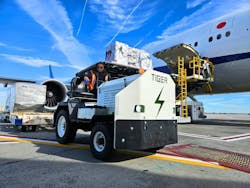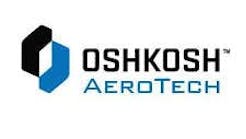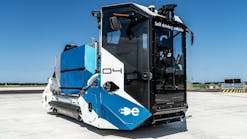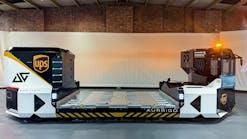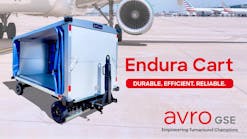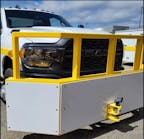With an increasingly growing focus on aviation’s sustainability, stakeholders throughout the industry, including ground service providers, are looking for ways to reduce their carbon footprint.
The Tiger Lithium-ion (Li-ion) tow tractor assists with these goals. The Tiger Li-ion is clean for the environment, low maintenance for technicians and provides safety features only found in electric vehicles (EVs).
“While the bulk of aviation emissions are from the aircraft itself, accessibility of sustainable jet fuel is still decades away. Converting from ICE [internal combustion engine] to electric GSE [ground support equipment], like Tiger Li-ion tow tractors, is a step that airports can make today,” says Gerry Hoadley, director of ground support equipment at Waev Inc.
“Compared to a single internal combustion tractor that emits an average of 3,250 kilograms of CO2 annually, an electric tow tractor emitting zero CO2 will assist with reducing an airport’s overall pollution output and contributing to the aviation industry’s sustainability goals.”
What is the Tiger Li-ion?
Tiger’s baggage and cargo tractors have a towing capacity of up to 60,000 lbs. Hoadley says they can also be utilized for moving small aircraft within their towing capacity.
“Our vehicles provide the same form factor as popular tractors on the market, with common parts that simplify operations and maintenance,” says Hoadley.
The chassis consists of a 100-percent steel body-on-frame with bolt-on components.
“The Li-ion Tiger design offers capabilities, operations and serviceability that’s familiar and proven in the ground support equipment space, providing a seamless experience for operators looking to electrify their established fleets with next-gen tractors. This familiar design requires little to no specialized operator training and includes many common GSE parts, simplifying operations and maintenance,” says Hoadley.
For operator comfort during the workday, ergonomic bucket seats are standard throughout the Tiger tow tractor lineup. Hoadley notes Tiger tow tractors offer the most spacious and operator-friendly cabs on the market.
Optional features include a full cab with doors as well as a heating and fan system. Additional options include bumpers, hitches, beacon lights and turn signals.
Sustainability
The Tiger Li-ion can be equipped with a 36kWH or 48kWH power module and offers flexible charging from an on-board charger that’s compatible with single-phase outlets to an off-board DC fast charger, according to Hoadley.
The batteries use LiFePO4 technology, which Hoadley notes is safer, more stable and more reliable than other lithium chemistries. At the end of their serviceable life as power modules, the LiFePO4 cells can be utilized for energy storage in things such as power walls and off-grid power sources.
Low Maintenance
Hoadley points out another advantage of Li-ion-powered equipment is it’s less costly to operate and maintain.
“Li-ion batteries last significantly longer than flooded lead-acid or AGM [absorbent glass mat] batteries – contributing to a lower total cost of ownership (TCO). In addition to the longer battery life, Li-ion vehicles save significant money and time because there are fewer ongoing costs due to reduced routine maintenance to the vehicle or the batteries. Unlike ICE vehicles, EVs don’t require traditional maintenance like oil changes, filter replacement or coolant flushes. And Li-ion batteries don’t require posts to be cleaned or fluid to be monitored or added, reducing maintenance and making them much more reliable,” he says.
Furthermore, Hoadley notes the regenerative braking of the Tiger Li-ion lessens on brake wear and boosts vehicle efficiency.
Safety
Vehicle electrification facilitates the ability to offer smart technology like the patent-pending anti-rollover system exclusive to Tiger tow tractors and programmable acceleration/deceleration and top speed.
“This technology allows users to improve their operations while exceeding traditional safety standards,” Hoadley says.
Li-ion tow tractors also incorporate standard safety features such as seat belts and high visibility LED lighting, as well as brake interlock, which forces the operator to be at a complete stop and the brake fully depressed before shifting to forward or reverse. Further increasing productivity and safety, onboard diagnostics help rapidly call attention to an issue so that it can be addressed immediately.
Conversion Kits
Not everyone is ready to dive into lithium-ion, and Hoadley says Waev officials understand this.
That’s why Waev developed the Tiger Repower conversion kit.
The Tiger Li-ion Tow Tractor debuted in 2022 and Tiger Repower Li-ion conversion kits for legacy gas tow tractors were introduced by Waev in 2023.
“Compatible with multiple tow tractors, the conversion kit gives legacy gas tow tractors a new, sustainable life with lithium-ion power – extending the life of current gas-powered fleets, saving thousands, cutting emissions and improving safety,” says Hoadley.
The kit takes 8 to 12 hours to install and includes a rear axle and drive shaft, motor with mounting brackets and hardware, dashboard with keyless power switch, LED headlights and tail lights, complete service brake system, parking brake system, brake switch, accelerator pedal, seat belts and full tractor wiring harness.
Lastly, for customers not ready to adopt Li-ion technology, Waev offers the Tiger G [Gas] series tractors.
“These tractors are powered by Kubota gasoline engines backed by GM automatic transmissions. The nice thing about these units is that they can be easily upfit to our Li-ion drive system when the time comes, utilizing our Tiger RePower kit which provides customers with everything needed to upgrade legacy ICE-powered tractor fleets,” says Hoadley.
